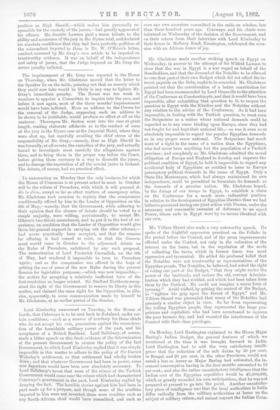Mr. Gladstone made another striking 'speech on Egypt on Wednesday,
in answer to the attempt of Sir Wilfrid Lawson to show that the war in Egypt is a war waged on behalf of the Bondholders, and that the demand of the Notables to be allowed to vote that part of their own Budget which did not affect the in- terest payable on the Debt, ought to be conceded. Mr. Gladstone pointed out that the consideration of a better constitution for Egypt had been recommended by Lord Granville to the attention of the Conference at Constantinople, and that it would have been impossible, after submitting that question to it, to reopen the question in Egypt with the Khedive and the Notables without any relation to the advice of the Conference. As it had been impossible, in dealing with the Turkish question, to treat oven the Bulgarians as a nation whose national demands could be regarded as in any sense binding upon Europe, since they had not fought for and kept their national life,—so was it even mc re absolutely impossible to regard the popular Egyptian demands as in any proper sense national. The Bulgarians had much more of a right to the name of a nation than the Egyptians, who had never been anything but the population of a Turkish province ; and completely as Mr. Gladstone admitted the moral obligation of Europe and England to develop and improve the political condition of Egypt, he held it impossible to regard any accidental body of Egyptians as entitled to issue to Europe peremptory political demands in the name of Egypt. Only a State like Montenegro, which had always maintained its own independence, could be permitted to formulate its demands as the demands of a genuine nation. Mr. Gladstone hoped, by the doings of our troops in Egypt, to establish a claim on the Conference for a much more influential position in relation to the development of Egyptian liberties than we had hitherto possessed during our joint action with France, under the necessary and reasonable restraint of deference to an equal Power, whose ends in Egypt were by no Means identical with our own.






























 Previous page
Previous page